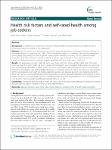Health risk factors and self-rated health among job-seekers
Freyer-Adam, Jennis
Gaertner, Beate
Tobschall, Stefanie
John, Ulrich
Background: To determine a) proportions of behavior related health risk factors among job-seekers and b) to what extend these are related to self-rated health. Methods: Over 12 months, job-seekers were recruited at three job-agencies in northeastern Germany. Among all individuals eligible for study inclusion, 7,906 (79.8%) provided information on smoking, risky drinking, overweight/ obesity (body mass index), fruit and vegetable intake, physical inactivity, illicit drug use, and self-rated health. Proportions and 95% confidence intervals stratified by gender, age and duration of unemployment were calculated. Multivariate logistic regression analyses predicting self-rated health were conducted. Results: The proportions of each health-risk factor were high, and 52.4% of the sample (53.4% male, 33.5 years mean age) had 3 or more health risk factors. Mostly, the proportions were particularly high among men and longterm unemployed individuals; e.g. 84.8% of the 18-24 year old long-term unemployed men were current smokers. Proportions of substance use related health risk factors were highest among the 18-24 year olds (e.g. risky drinking 28.7%), and proportions of health risk factors related to nutrition and physical inactivity were highest among the 40-64 year olds (e.g. overweight/obesity 65.4%). Depending on gender, all health risk factors and having 3 or more health risk factors were associated with lower self-rated health; odd ratios ranged between 1.2 for smoking (95% CI: 1.0-1.3) and 1.7 for overweight and physical inactivity (95% CI: 1.5-1.9). Conclusions: Prevention efforts to reduce health risk factors and to increase health among job-seekers are needed, and job agencies appear a feasible setting for their implementation.
No license information
Related Items
Show related Items with similar Title, Author, Creator or Subject.
-
2023-09-07ZeitschriftenartikelMental Health Surveillance in Deutschland Walther, Lena; Mauz, Elvira; Hölling, Heike; Thom, JuliaMit der Etablierung der psychischen Gesundheit als Public-Health-Thema wird auch ihre Surveillance (Überwachung) gefordert. Am Robert Koch-Institut ist daher eine Mental Health Surveillance für Deutschland im Aufbau. Die ...
-
2008-08-29Berichte und sonstige TexteReport: "Health in Germany" Robert Koch-InstitutLife expectancy is rising and the general health situation is good, but the number of people who smoke, are too fat, take too little exercise and/or drink too much alcohol is still too high. These are the main conclusions ...
-
2022-10-26Berichte und sonstige TexteNotaufnahmesurveillance Wochenbericht 01.01.2022 - 23.10.2022SUMO TeamSUMO ist ein am Robert Koch-Institut entwickeltes und betriebenes System, welches Gesundheitsdaten für Public Health-Surveillance verarbeitet und bereitstellt. Der Notaufnahmesurveillance Wochenbericht enthält Daten der ...

